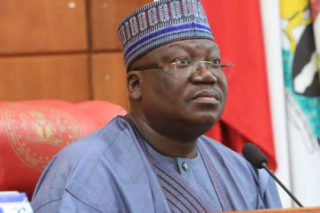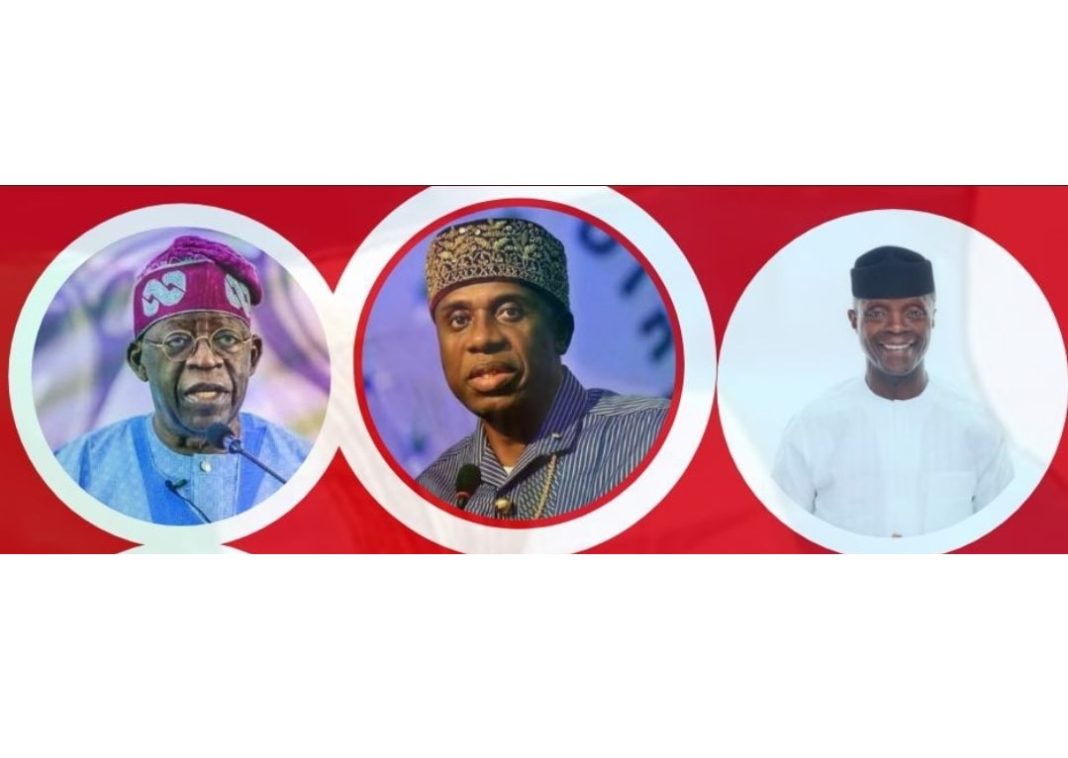The race for the All Progressives Congress (APC) presidential ticket has narrowed to a straight contest between four leading aspirants – Vice President Yemi Osinbajo, former governor of Lagos State Bola Tinubu, former minister of transportation Rotimi Amaechi, and Senate President Ahmad Lawan – on the day of the APC presidential primary election.
Kayode Fayemi, Governor of Ekiti State and Chairman of the Nigeria Governors’ Forum (NGF), and Ebonyi State Governor Dave Umahi are the two candidates on the outskirts.
As Vice President, Osinbajo should depend on President Muhammadu Buhari’s backing, as well as the benefit of incumbency. However, after notifying Nigerians that he had a favoured candidate whose name he indicated he would keep hidden, and subsequently requesting APC governors to back him in selecting his successor, Buhari announced on the day of the primary election that he has no nominee.

However, Osinbajo is one of the most likely candidates to run on the APC ticket. There are suspicions that Buhari will want the VP to carry on with his administration’s programmes, and if that is the case, an unpublicized endorsement and support from the President can go a long way toward tipping the scales in Osinbajo’s favour.
However, Osinbajo will almost certainly share South-West votes with Tinubu and Fayemi, which may erode his zonal advantages.

Tinubu, the APC’s national leader, has always been the man to beat in the race for the party’s presidential ticket for the 2023 general elections. In addition to his strong political structure, Tinubu benefits from a widely reported agreement in which Buhari agreed to hand over to him (Tinubu) at the end of his (Buhari’s) tenure. According to Tinubu’s camp, the agreement served as the foundation for Tinubu’s support for Buhari’s election as President in 2015.
Tinubu paid a visit to Buhari at the Presidential Villa before announcing his intention to run for president in 2023. The purpose of the visit was to solicit Buhari’s support and thus activate the contentious agreement between the two men.
Buhari has not openly supported Tinubu’s ambition thus far, and the President’s body language does not suggest that Tinubu is his preferred candidate. Tinubu’s recent outburst, while speaking to APC delegates in Ogun State, is seen as an angry reaction to the President’s refusal to support his ambition.
Tinubu stated that Buhari would not have become President without his support, and that he expects Buhari to reciprocate by handing him the presidency.
The APC national chairman, Abdullahi Adamu, a Buhari supporter, has hinted that the party may sanction Tinubu for his remarks, and the presidency responded on the eve of the national convention by declaring that no single person should claim the glory of Buhari’s victory in 2015.
In a statement issued in response to Tinubu’s claims, Senior Special Assistant to the President on Media and Publicity Garba Shehu, clearly speaking for Buhari, stated that the manner in which Buhari was elected in 2015 was unrelated to the 2023 general election.
“What matters is the future: the policy platforms, ideas, drive, and resolve to take over the President’s stewardship of our country and build on his legacy to make our country better than it has ever been.” “The person most demonstrable in those qualities is the one to lead our party and our country forward,” the presidential aide added in the statement, implying that Tinubu is not Buhari’s ideal successor.
However, in a primary election in which aspirants are given a level playing field, as promised by Buhari, Tinubu should be optimistic.
Amaechi lacks the incumbency factor which favours Osinbajo, and the strong political structure which is Tinubu’s major advantage. But the Rivers State governor is a dogged fighter who has paid his dues in the APC. He is also one of a small circle of APC politicians who are regarded as Buhari’s possible preferred successors.

Amaechi is very close to Buhari, having led the President’s election campaigns in 2015 and 2019.
In addition, the former Speaker of the Rivers State House of Assembly has strong connections in the North, where he is widely accepted as demonstrated by his recent title as Dan Amanar Daura (trusted son of Daura) by the Emir of Daura, Umar Farouk.
Although a controversial move by APC national chairman Adamu to declare him as the consensus candidate was foiled on June 6, Senate President Ahmed Lawan remains a formidable force in the race for the party’s presidential ticket.

The fact that Lawan is the only major aspirant from the North is enough advantage on its own, going by the region’s penchant to vote in a bloc, and according to ‘Northern interests’. The Northern APC governors may have backed power shift to the South, but the Senate President remains in race for APC presidential ticket.
Minutes before Buhari’s meeting with the presidential aspirants on June 4, APC governors from the North issued a joint statement backing the power shift to the South. The Northern APC governors said in the statement that after Buhari’s eight years, a Southerner should become Nigeria’s President.
To emphasise the position of the Northern governors, who had before now opposed their Southern counterparts’ call for power shift to the South, Jigawa State Governor Abubakar Badaru – the only sitting Northern governor in the presidential race – withdrew from the contest.
Southern groups and stakeholders, including the Southern Governors Forum, have hailed the gesture by the Northern governors.
But Senate President Ahmed Lawan – regarded as one of the leading aspirants – is still in the race.
Lawan emerged as one of the leading aspirants for the APC presidential ticket after former Vice President Atiku Abubakar was elected the flagbearer of the opposition Peoples Democratic Party (PDP). Lawan, from Yobe State, is from the North-East, like Atiku and many party stakeholders believe he should get the APC ticket to counter regional advantages Atiku’s candidacy would give the PDP in the North, which has a large voting population.
Also, despite the APC Northern governors’ endorsement of power shift to the South, the North-East as a geopolitical zone is arguing that it should be given the opportunity to produce the President, having not had the privilege since Nigeria returned to democratic governance in 1999.
Lawan’s endorsement by APC national chairman Adamu could also be an indicator of where Buhari’s interests lie. Adamu is Buhari’s man and he reportedly said he arrived at the decision to name Lawan consensus candidate with the President’s permission. Despite Buhari’s declaration that he has no candidate, Adamu’s action may suggest otherwise.
The Senate President’s president in the presidential race may negate the effect of the Northern governors’ decision to support the power shift to the South.
Just like Tinubu, a level playing field in the APC presidential primary will also favour Lawan.
Northern votes will be decisive
With most of the leading aspirants coming from the South, Northern delegates, and by extension, Northern votes, will be decisive in the outcome of the APC presidential primary.
The Northern votes are a factor that can work in the favour of Senate President Ahmed Lawan – unless the Northern APC governors are able to get their delegates to refrain from voting for the Yobe State politician.
Northern votes decided the PDP presidential primary in favour of Atiku Abubakar. A similar outcome is not unlikely in the APC primary election.
Tinubu, Osinbajo and Amaechi are going to be successful to the extent that they are able to get the votes of the Northern delegates. Tinubu will be counting on his large political structure to attract the votes of delegates from the North. Osinbajo and Amaechi also have considerable support in the region.
2,340 delegates to elect APC presidential candidate
Two thousand, three hundred and forty delegates will vote at the APC presidential primary election.
The 2,340 are made up of three elected adhoc delegates from each of the 774 local government areas (LGAs) in the country and the six Federal Capital Territory (FCT) area councils.
Lost jumbo delegates
The new Electoral Act 2022 did not allow voting by statutory delegates in political party primary elections. An amendment passed by the National Assembly, aimed at reversing the situation, has not been signed into law by the President.
As a result, public officials such as the President, Vice President, members of the National Assembly, governors and their deputies, members of the state houses of assembly, chairmen of councils, councillors, and members of the national working committee, amongst others, who are regarded as statutory delegates in political parties, would not vote in the presidential primary election.
The development will have a major impact on the APC presidential primary election. With statutory delegates ‘disenfranchised’ by the Electoral Act 2022, the number of delegates that would vote in the APC primary election has dropped from 7,800 to 2,340.
The 2,340 are made up of three elected adhoc delegates from each of the 774 local government areas (LGAs) in the country and the six Federal Capital Territory (FCT) area councils.
The non-participation of statutory delegates may affect the electoral fortune of some aspirants, particularly those who ordinarily should be banking on ‘jumbo delegates’ – a term that refers to a situation where a state has a huge number of delegates due to the presence of a large number of public officials.
Lagos, Tinubu’s stronghold, has a large number of APC public officials and if statutory delegates were to be involved in the primary election, the state will have about 304 delegates. But without statutory delegates, as dictated by the Electoral Act 2022, Lagos is going to the primary election with just 60 delegates – three delegates each from its 20 LGAs.
Going by the previous computation that included statutory delegates, Lagos was among the top five states with the highest number of delegates. But without the statutory delegates, the state is now occupying the 19th position in the number of delegates.
North-West has largest number of delegates at APC presidential primary
A breakdown of the number of delegates that would represent the various states and the FCT in the APC presidential primary election shows that the North-West has the highest number with a total of 558 delegates.
The South-West is second with 411 delegates, followed by South-South with 369 delegates. The North-Central occupies the 4th position with 363 delegates. The North-East is next with 336 delegates.
The South-East, with 288, has the lowest number of delegates that will be voting in the APC presidential primary election.
Breakdown of the delegates by states and zones
South-West: Lagos – 60, Ekiti – 48, Ogun – 60, Osun – 90, Oyo – 99, Ondo – 54. Total – 411.
South-South: Akwa Ibom – 93, Bayelsa – 24, Cross River: 54, Delta – 75, Edo – 54, Rivers – 69. Total – 369.
South-East: Abia – 54, Anambra – 63, Enugu – 51, Ebonyi – 39, Imo – 81. Total – 288.
North-East: Adamawa – 63, Bauchi – 60, Gombe – 33, Borno – 81, Yobe – 51, Taraba – 48. Total – 336.
North-Central: Kogi – 63, Kwara – 48, Benue – 69, Plateau – 51, Nasarawa – 39, Niger – 75, FCT, Abuja – 18. Total – 363
North-West: Kaduna – 69, Kano – 132, Katsina – 102, Kebbi – 63, Jigawa – 81, Sokoto – 69, Zamfara – 42. Total – 558.

